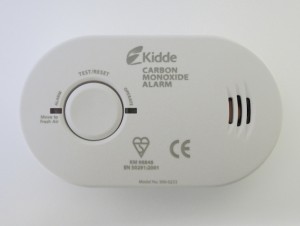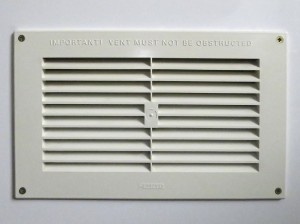10 home safety tips
Home safety is of paramount importance for all of us, and from time to time we should all take a ‘step back’ and just make sure that we’re doing everything we reasonably can, to make our homes as safe as possible. I don’t want to talk about home security here, as I think that is a separate topic in itself, but rather, issues more concerned with topics such as fire safety. The below list of 10 home safety tips doesn’t cover everything, but certainly contains many of the main issues.
1. Smoke alarms
Smoke alarms are simply vital in every home. They detect smoke in the atmosphere, and alert you to the fact, with a very loud alarm. They may be mains operated with battery back-up, or simply battery operated, and the latter need minimal DIY skills for installation. For some more information on the different types of smoke alarm, see my guide – ‘Fitting a smoke alarm’. If you already have smoke alarms, make sure you test that the batteries are still working on a regular basis.
2. Carbon monoxide alarms

Carbon monoxide alarms can be fitted in literally minutes.
Carbon monoxide (CO) alarms should never be confused with smoke alarms. They are two completely different devices, doing two completely different jobs. CO alarms can detect dangerous levels of CO in your home, and like a smoke alarm, it will sound off and alert you to the need to get out of your house. Why might you have dangerous levels of CO? Most commonly as a result of a malfunctioning fuel burning appliance, such as a gas boiler, or a leaking flue, and the reason you must have CO alarms is because the gas is completely odourless and colourless – therefore without an alarm, you simply would never know it was there. For more about how easy it is to install CO alarms, see my guide – ‘Fitting a carbon monoxide alarm’. If you have CO alarms fitted, be sure to test the batteries regularly, and remember that CO alarms will go past their ‘sell-by date’ after a period of time (normally a few years but check the manufacturer’s guidelines for your particular alarm variety).
3. Fire blankets
Another useful item to have in your house is a fire blanket. Fire blankets have been around for years, and with good reason as they are an incredibly good way of dealing with a small fire, such as a pan fire in a kitchen. Once the blanket has been deployed, never remove it from the fire until you are certain that both the fire is out and the pan has cooled down completely. Always read the instructions on the blanket for exactly how it must be used.
4. Fire extinguishers

Read fire extinguisher instructions carefully so you’ll be prepared in an emergency.
For dealing with a small fire, fire extinguishers offer an excellent option, but you must take care to use the correct type of extinguisher depending on what type of fire you are dealing with. For example you can buy Water, Foam, Powder and Carbon Dioxide extinguishers, and each has various advantages and disadvantages depending on the fire type. Therefore make sure you read the instructions and guidelines on your extinguisher well before you may have occasion to use it! Remember that with both fire extinguishers, and the previously mentioned fire blankets, only tackle a small fire if you’re sure you can handle it – if in any doubt, get everybody out of the house, and call the emergency services.
5. Escape routes
Make sure that everybody in the house knows what to do in the event of a fire. In other words, be certain that everybody knows what the main escape route is, but equally importantly, what the alternative escape routes are, if the main one is blocked. With this in mind you may want to look at purchasing escape ladders that can be used out of windows, or, maybe knocking though an extra door to provide an alternative escape route. You could also consider fitting some fire doors, which will ‘buy’ time in the event of a fire. All of these are examples, and you need to look at your particular circumstances and decide where you can make improvements.
6. Boiler servicing
Boilers must be serviced at least once a year. Take a look at your boiler specifications and make sure you read exactly what the manufacturer’s recommendations are for servicing and maintenance. Also, servicing must be carried out by a professional with the correct accreditation. For example, gas boilers in the UK can only be serviced by a Gas Safe registered engineer.
7. Fuel burning appliance servicing
Even if you get your boiler serviced, what about the other fuel burning appliances in your home? Gas cooker maybe? Separate water heater possibly? Have you got a gas heater or fire of some sort? Â These also must have periodic servicing and maintenance, so don’t stop with the boiler, make sure other items in your home are also functioning safely.
8. Ventilation

Never obstruct a ventilation grill, as it’s there for a vital reason.
Always be aware that any vents in your home are there for a reason and never cover them over, or block them up, as this could cause fatal consequences. A dramatic, yet true statement, but often these vents are essential to ensuring that fuel burning appliances receive enough fresh air so that they function correctly. Therefore block them and you risk malfunction, and the possibility of toxic gases such as carbon monoxide building up in the air, in your home. Therefore, never, ever, block a vent unless you are certain it is no longer required, and it really is always best to seek professional advice on this matter.
9. Electrical check
You really should know when your home was last checked for electrical safety. If you’re unsure, you may find that there’s a card or sticker near your fuse box or consumer unit, which will give details of any inspections. In the UK, for an owner occupied home, you should have a safety check every ten years. Personally, I think a little more often is advisable, after all with rented properties it’s every five years. Also, I always advise people with aging fuse boxes to get them updated to a modern consumer unit. It really isn’t as expensive as you think, and it will provide a lot more peace of mind.
10. Child safety
Last but not least, if you have children, it does become necessary to be more vigilant about safety in practically every area of your home. There is a long list of recommended items including safety gates, window locks, various child locks for doors and cupboards, oven locks, electrical socket covers………and the list does go on. You can never cover very eventuality, but do take a check on the precautions you do take as a parent. I also strongly advise that if you’re a prospective parent, and think you don’t need to worry until your newborn(s) start moving around and ‘investigating’, then think again, get the work done now, whilst you still have the energy!
This list of tips by no means covers everything, and is not meant to instigate paranoia, but with a lot of the items mentioned, we can all become a bit ‘I’ll take a look at that next week’, and I just think that with home safety, you must be more along the lines of ‘I’m going to do that now’. So, work through the above list, and see where you can make improvements in home safety. Even if you have to part with some money, it truly is money well spent.
